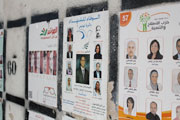 One image has become a symbol of last month’s elections in Tunisia: street walls covered with equidistant, symmetrical rectangles marking spaces for political parties to publicize themselves. This image foretold the orderly and well-conducted elections that took place on October 23rd and afforded Tunisians the opportunity to freely choose their representatives to the National Constituent Assembly.
One image has become a symbol of last month’s elections in Tunisia: street walls covered with equidistant, symmetrical rectangles marking spaces for political parties to publicize themselves. This image foretold the orderly and well-conducted elections that took place on October 23rd and afforded Tunisians the opportunity to freely choose their representatives to the National Constituent Assembly.
Regardless of the results and the subsequent debate raging about the implications of the victory of the Islamist party Al-Nahda (with 41.47 percent of the votes), the electoral process was deemed a success. The high level of participation—reaching up to 80 percent in some districts—and the absence of major clashes or accusations of falsification are turning points in legitimizing both the elections and the Tunisian transition period as a whole. The freedom and fairness of the process has been corroborated by the reports of national and international observers.
After an initial postponement of election day from July 24th to October 23rd on the grounds that more time was needed to guarantee the vote would satisfy “international standards,” the interim Tunisian authorities lived up to their promise and now stand ready to hand over power as soon as the new authorities are appointed by the newly-elected Assembly. This is no small achievement, given the difficulties being experienced by other Arab countries.
Tunisians organized a sophisticated public awareness campaign aimed at electoral participation and distinguished itself by the impressive use of information technology and communication to support voters. As an example, a four-digit number was set up by the High Independent Committee for the Elections to answer all queries, and a free SMS service was set up to find the polling office assigned to voters. Once again, we are reminded of the increasing importance in this part of the world of new technologies as elements for change—the same ones that were instrumental in the fall of the previous regime.
The critical role played by the Tunisian army is also worth mentioning, and constitutes a positive precedent worth emulating. Following an agreement between the Ministry of Defense and the Independent Electoral Commission, the military provided some 30,000 soldiers— men and women— to help secure the perimeters of polling stations on election day and provide logistical support such as transporting equipment and ballot boxes.
Part of the success of the Tunisian transition has also to be attributed to the various ad-hoc commissions which have been established to guide the process, and which are slated to be dissolved at the termination of their mandate. The first to go, on October 13th, was the High Authority for the Implementation Revolution’s Objectives, Political Reform and Democratic Transition which spearheaded various pieces of legislation and codes of conduct relating to the electoral process, the work of political parties, civil society organizations, and the media.
Clearly, it hasn’t been a perfect process. There were accusations that the Islamic Al-Nahda had access to foreign and domestic sources of funding which gave it an unfair advantage over other political parties from abroad—the same accusations were leveled against another party, the Popular Petition—and that the media, both national and international, were biased in its favor. Other minor irregularities are being examined by the Electoral Commission and the Administrative Tribunal. However, these imperfections are not deemed serious enough to tarnish what is judged as a successful exercise.
The transition road for Tunisia is still long and will be, at times, tortuous. For example, the Commissions charged with identifying the perpetrators of egregious human rights violations and other crimes committed before and during the revolution has still a long way to go. And so does the Commission seeking to trace the funds that have been embezzled by the previous regime. However, the calm, organized and dignified manner with which the Tunisians conducted their first free and fair elections bodes well for the future.
Photo credit: gr33ndata




